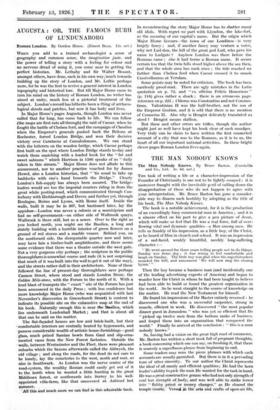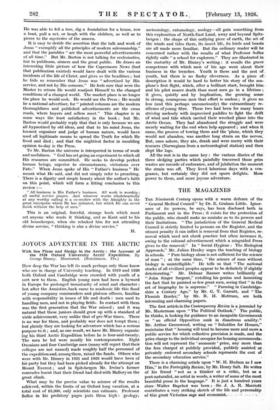THE MAN NOBODY KNOWS
The Man Nobody Knows. By Bruce Barton. (Constable and Co., Ltd. 3s. 6d. net.) THE task of writing a life or a character-impression of the Founder of Christianity is one not to be lightly essayed ; it is moreover fraught with the inevitable peril of calling down the disapprobation of those who do not happen to agree with your interpretation. Mr. Bruce Barton has gone a consider- able way to disarm such hostility by adopting as the title of his book, The Man Nobody Knows.
The book is a notable achievement, for it is the production of an exceedingly busy commercial man in America ; and it is a sincere effort on his part to give a pen picture of Jesus, which will make us feel that He was a real force, full of over- flowing vital and dynamic qualities—a Man among men. He
tells us frankly of his impression, as a little boy, of the Christ, as he heard of Him in church and school. It was an impression of a sad-faced, weakly- beautiful, meekly long-suffering character :— " He went around.for three years telling people not to do things. Sunday was Jesus day ; it was wrong to feel comfortable and laugh on Sunday. The little boy was glad when the superintendent sounded the bell, and announced 'We will now sing the closing hymn.'" Then the boy became a business man (and incidentally one of the leading advertising experts of America) and began to wonder how the Christ in whom he had been taught to believe
had been able to build or found the greatest organization in the world. So he went straight to the source of knowledge on the matter. He read the New Testament for himself.
He found his impressions of the Master entirely reversed : he discovered one who was a successful carpenter, strong in muscle, efficient in work. He discovered "the most popular
dinner guest in Jerusalem " who was yet so efficient that He "picked up twelve men from the bottom ranks of business, and forged them into an organization that conquered the world." Finally he arrived at the conclusion : "this is a man
nobody knows."
So, having had a vision on the great high road of commerce, Mr. Barton has written a short book full of pregnant thoughts, a book concerning which one can say, on finishing it, that there is scarcely a superfluous phrase from beginning to end.
Some readers may miss the pious phrases with which such accounts are usually garnished. But there is in it a pervading tone of utter sincerity. To our author the Christ represents the ideal of all manly and efficient. qualities ; He had the born
leader's ability to pick the man He wanted for the task in hand. He was a great constructive genius who had not only strength of soul but strength of body, and was well able to strike terror into "flabby. priest or money changer," as He cleared the
templelcourti.' Versa in the arta and crafts of open-air life,
He was able to fell a tree, dig a foundation for a house, row a boat, pull a net, or laugh with the children, as well as to pierce to the mysteries of the unseen.
It is easy to'deride the assertion that the talk and work of Jesus "exemplify all the principles of modern salesmanship," and that the parables "are the most powerful advertisements of all time." But Mr. Barton is not talking for ecclesiastics, but to publicans, sinners and the great public. He draws an interesting little picture of how the Capernaum News (had that 'publication existed) would have dealt with the various incidents of the life of Christ, and gives us the headlines ; but he bids us remember that Jesus was "advertised by His service, and not by His sermons." He feels sure that were the Master to return He would readjust Himself to the changed' conditions of a changed world. The market place is no longer the place he would seek. He would use the Press ; He would be a national advertiser, for "printed columns are the modern thoroughfares and published advertisements are the cross roads, where buyers and sellers meet." This chapter is in some ways the least satisfactory in the book ; but Mr.
Barton would probably reply that that is only because we are all hypnotized by old ideas, and that to his mind Jesus, the keenest organizer and judge of human nature, would have
used all legitimate means to spread the Truth for which He lived and died ; and that the mightiest factor in moulding opinion to-day is the Press.
To Mr. Barton the universe is interpreted in terms of work and usefulness. "God has set going an experiment to which all His resources are committed. He - seeks to develop perfect human beings, superior to circumstances, victorious over Fate." When Jesus spoke of His "Father's business" He meant what He said, and did not simply refer to preaching. There is a dignity and simple beauty about the author's faith on this point, which will form a fitting conclusion to this review :—
" All business is His Father's business. All work is worship ; all useful service prayer. And whoever works wholeheartedly at any, worthy calling is a co-worker with the Almighty in the great enterprise which He has initiated, but which He can never finish without the help of men."
This is an original, forceful, strange book which must set anyone who reads it thinking, and as Kant said to his old housekeeper, when she rebuked him for not attending divine service, "thinking is also a divine service." H.



















































 Previous page
Previous page